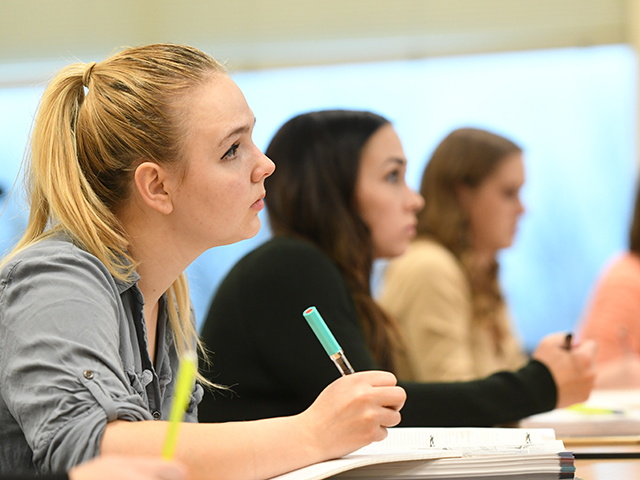Three national awards recognizing SLCC’s writing programs can be traced back to a simple finding that Professor Tiffany Rousculp relied on while developing a program that would shift the college’s writing culture: Writing is a vulnerable act. Writing is infused with emotion. This is true not just for students, but for everyone who writes at SLCC: faculty, staff and administrators.
“People fear their own writing being judged, while they can also be judgmental of others’ writing that comes their way,” explains Rousculp, whose work and collaboration with others, including interviewing more than 80 students, staff, and faculty, resulted in SLCC’s Writing Across the College (WAC) program (founded in 2014).
She set out to model a compassionate mindset when approaching another’s writing. As the director of the WAC program, she does this through faculty and staff workshops, one-on-one collaborations, and a plethora of resources.
SLCC’s WAC grew from an intentional resolve to not follow a typical approach to Writing Across the Curriculum, a national model found at many colleges and universities.
“I modified the approach because it just doesn’t work at two-year colleges, and we had tried twice before and failed,” says Rousculp, who founded SLCC’s Community Writing Center in 2001. She drew from this experience, much of which she shares in her book, Rhetoric of Respect.
“I knew the Writing Across the Curriculum model would not work unless we focused on everyone’s writing, not just students — everyone’s writing had to have worth and be supported.”
A Win-Win for Faculty and Their Students
When Rousculp works with faculty, she focuses on several areas that can result in a win-win for both faculty and students. The first is to help faculty develop more compassionate relationships with their students in regard to writing. This can be especially important when addressing writing from an English-language learner or a student with invisible disabilities that are not immediately apparent, like dyslexia or ADHD.
“With a compassionate approach, a teacher will have more patience and understanding when met with writing that does not meet expectations,” explains Rousculp. “The mindset needs to be that the student may be coming from a place of difference rather than from a place of deficit.”
Another area involves helping faculty communicate clear expectations through the Transparent Assignments initiative. “One of the main reasons students get frustrated is because they don’t know what their teachers are expecting — WAC provides simple and straightforward ways for faculty to share expectations,” adds Rousculp.
2022 Writing Awards
Conference on College Composition and Communication’s (CCCC) Certificate of Program Excellence
Received: Spring 2022
The CCCC is the national organization representing composition and writing studies in higher education.
Nell Ann Picket Service Award for the Teaching English in the Two-Year College
Received: Spring 2022
“The committee is impressed with the innovative and transformational work behind SLCC’s WAC and writing center programs and recognize the vision, leadership, labor, and advocacy required to build and sustain such programs … Additionally, Tiffany’s efforts, which are nationally recognized, have elevated the two-year college voice in disciplinary conversations around writing programs.”
2022 Exemplary Established Writing Across the Curriculum Program Award
Received: Summer 2022
“We admire the way the program has whispered its way into existence, aware of its institutional context: growing slowly, building off current structures, and leveraging opportunities … Noteworthy initiatives include the student writing repository, commitment to anti-racist writing pedagogies, and the assignment transparency study and document. We found the program’s dedication to a culture of writing open to all especially noteworthy.”


Comments
Post a Comment